Sand and cycling usually don’t go together. But I couldn’t miss the main attraction of Namibia, the highest sand dunes in the world in Sossusvlei. The dunes are located about 60 km from Sesriem on a dead-end road running along the Tsauchab river, yet another river without water.
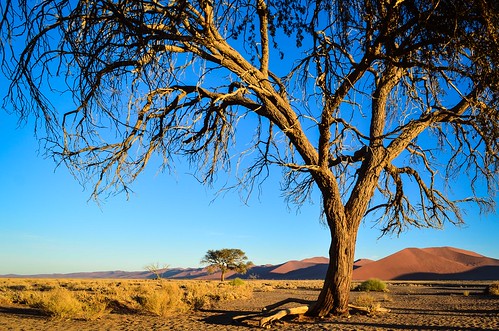
Nobody can stay overnight in the dunes, and the closest accommodation is in Sesriem, with a few lodges and campsites. For a cyclist, it means cycling 60 km of good tar road from the sunrise, visit the dunes, and cycle 60 km back before sunset. Or, hitchhiking.
The first option would make me completely miss the beauty of the site, so I pack my tent from 5 am, still at night (but the jackals are gone), to be at the gate early. It’s not fun, and cold, but it’s for a good cause. The manager of the gas station lets me lock my bike and luggage in a storage area, and I’m now a pedestrian for a day.
Being at the gate at 6 am doesn’t help: cars are only allowed to enter from sunrise, which is at 6:45 am today. Only visitors staying inside the park are allowed to leave earlier and enjoy the sunrise from inside the dunes, this is a privilege they get for overpaying a poor service. Having found a Swiss family queuing in line with a spare seat, we wait until the gate opens, and drive quickly until Dune 45.
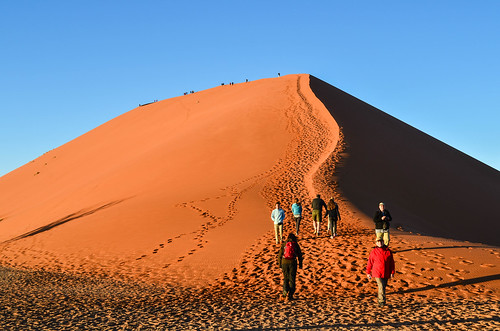
The reason why sunrises and sunsets are so praised in Sossusvlei is that colors and shadows at these times of the day produce a stunning effect. There are already many footsteps on the edge of the dune, but the sand elsewhere is pristine.
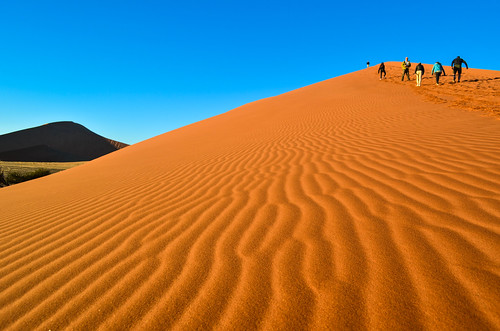

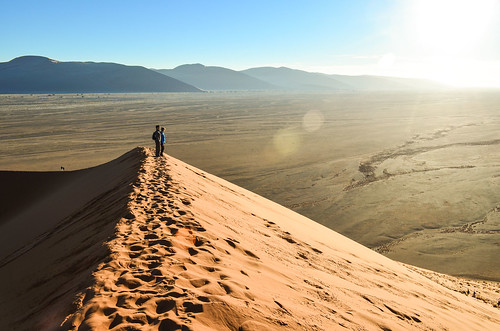
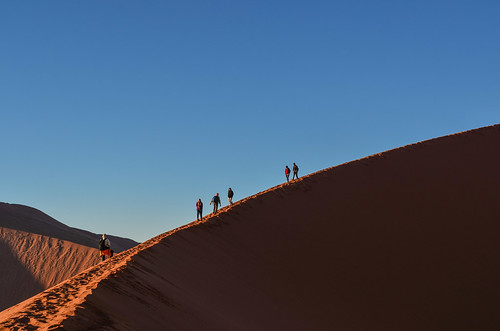
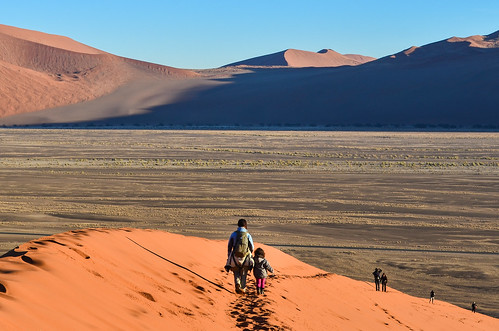
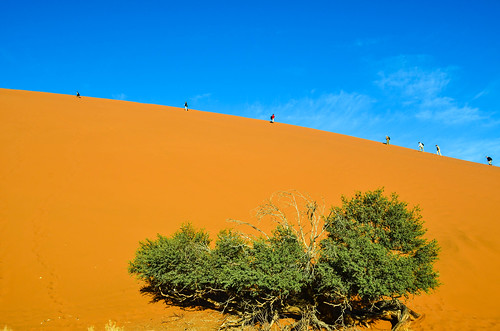
The highest dunes are a few kilometers further, 15 more, since Dune 45 is only 45 km from Sesriem. The last 5 km are very sandy, and only 4×4 vehicles are allowed to drive in. For others (not that many, one rarely sees non-4×4 vehicles in Namibia outside Windhoek), they must stop and take a shuttle. The shuttles are built on Toyota Land Cruisers, once again from the brand that makes cars that go everywhere.
Not surprisingly, we have to drive around a jam caused by a 4×4 stuck in the sand (a 4×4 vehicle doesn’t mean that the driver knows how to operate it, and even though, off road driving require technique).


At the end of the sand road, it’s really the end. Check the satellite map and zoom out: there isn’t anything but sand dunes for 50-150 km around. A “pet jackal” welcomes visitors, some must give him food. However, the black-backed jackal can carry rabies and kill animals bigger than a human, so it’s not so cute anymore when it gets too close.
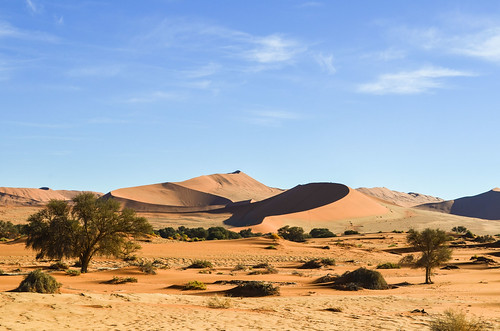
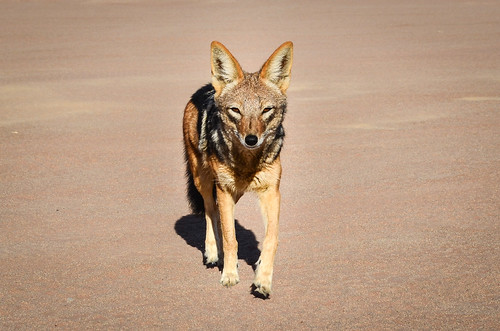
At this point, I leave my drivers and start walking one of the highest dunes, the Big Daddy dune. It is said to peak at 325 m, but since it’s a dune, it can’t be static. My poor GPS signal tells me the dune is above 800 m high, which makes it more than 200 m higher than the valley. Anyway, 200 or 300 meters of elevation to climb in the sand requires quite some effort. I will make a loop and return via Deadvlei.
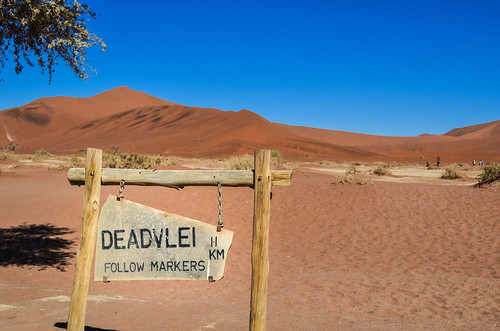

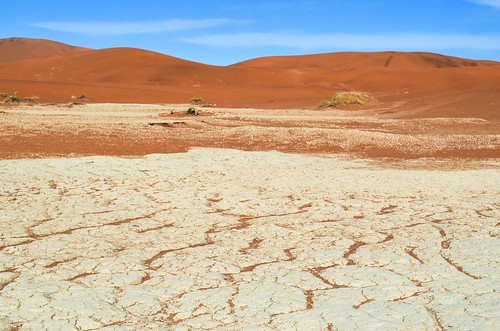
The landscape and colors are already terrific, but on the top of it, there are now white clay pans, a cracked dry hard soil, to bring contrast with the blue sky and the warm dunes.
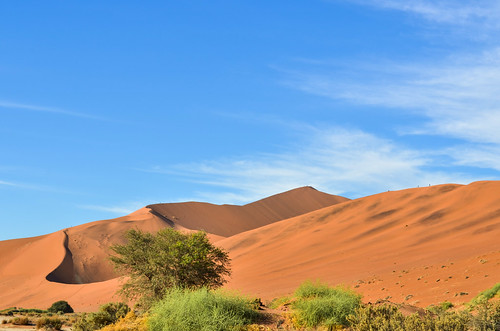
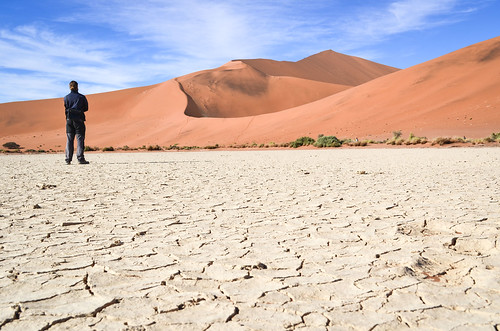
It’s not easy to walk up the Big Daddy, and few of the visitors do. It’s not surprising since many are pensioners spending weeks in a Land Rover. But the view at the top is obviously worth it, and for the most popular attraction of the country, I hardly feel disturbed.
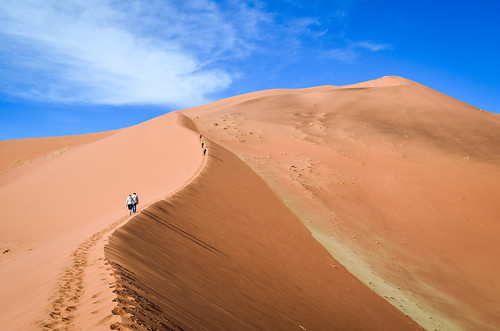
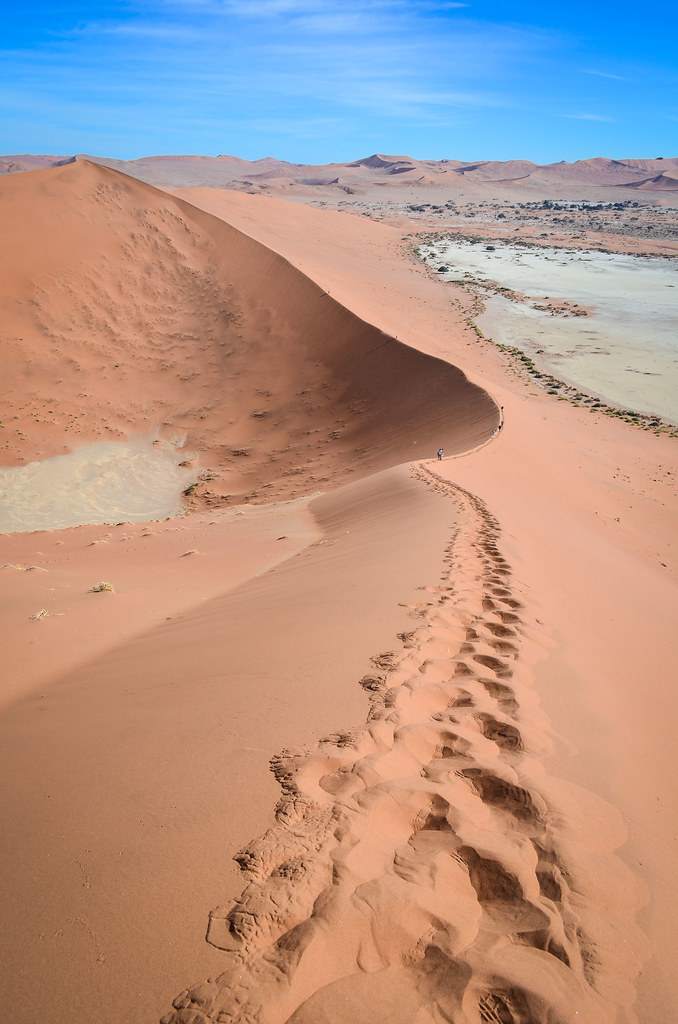
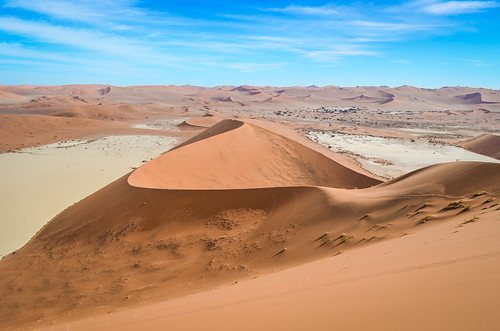


Even better than the view at the top, is the silence. There is no sound at all. It’s not surprising, what can survive there?

After a long time watching, I spot a black bird and hear a few others singing. There is a plane passing there as well. But really, apart from this, it feels like being in a still picture.
All the tourists left already, and it’s not even 12. They’re all talking about “being there for sunrise”, but as a result, they were always walking behind someone else. I believe the point in being in one of the world’s greatest desert is to witness it empty, feel it empty, and feel very small. And it’s not like the scenery turns ugly just after sunrise …


It will be soon too late to experience a cellular-signal-free corner of the earth, and even from Big Daddy’s top, one signal bar comes and goes.
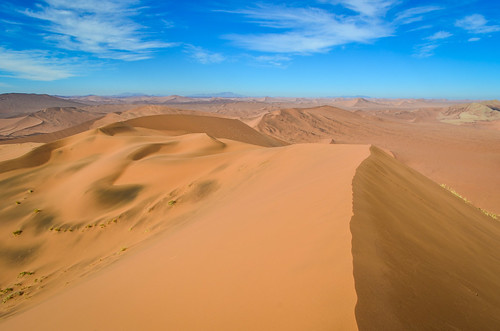
Yet, the best is to come. I walk down to another clay pan, Deadvlei.
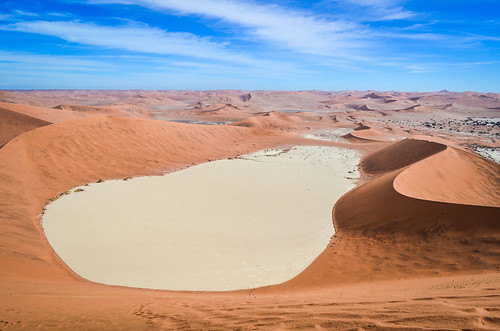


Dune climbing is actually the opposite as hiking: going uphill is annoying because for each step you take up, you sink back half the distance. And going downhill is fun because the slopes are very steep, and pain-free for the knees.

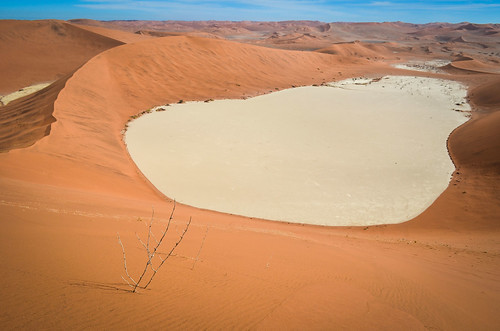


Now, that’s impressive. Nothing fits in the frame. The dunes are too high, 360° around me, and the cracked white soil is endless.

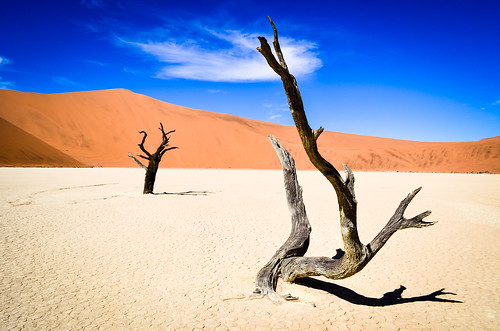
And to walk back until the parking lot, I must cross a “forest” of petrified trees. That’s surreal!
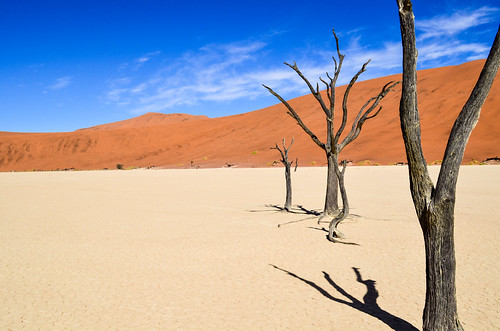
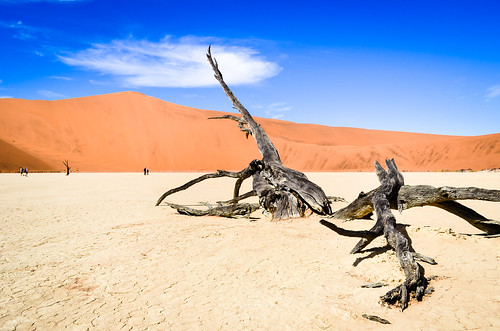
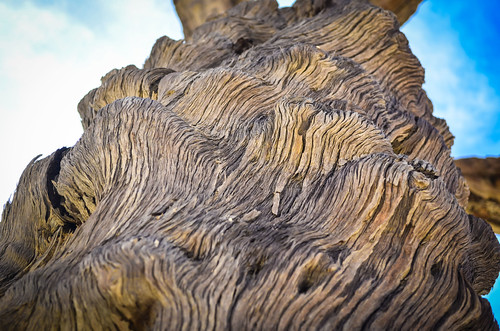
These trees are actually not petrified. They are just dead, but nothing decomposes them, and there is no humidity. So they have been standing there, as if they were needed to put a scale to the rest of the scenery. They are believed to be 900 years old.
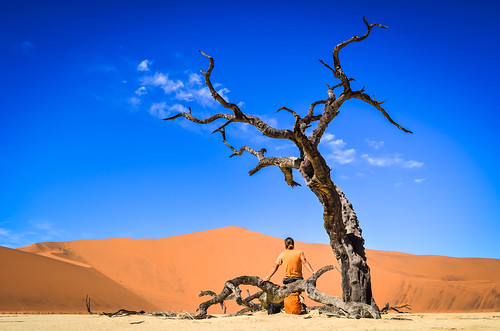
I’d say between 300-500 visitors were here early this morning. And now, I am left in Deadvlei by myself. I eat my picnic in the shade of a tree, I take pictures forever, and it’s never enough. It’s really one of the most surreal place on Earth I have been to. And it’s not just a viewpoint, it’s a whole deserted world.





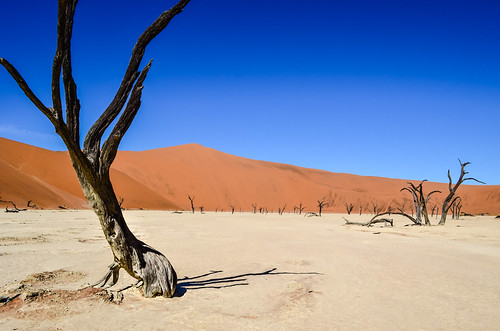
I still have some hours for walking around. Sossusvlei, the name for the whole site, is actually the name of the vlei at the foot of Big Mama dune, on the other side of the parking lot. It’s nowhere as impressive as Deadvlei and Big Daddy, and walking that much in the sand is getting tiresome.
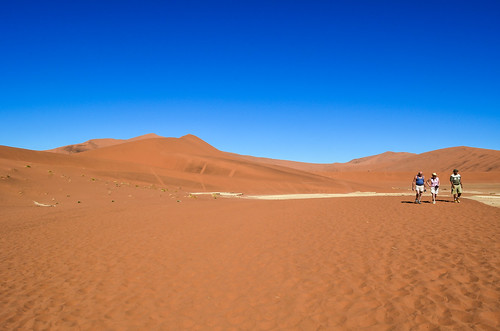

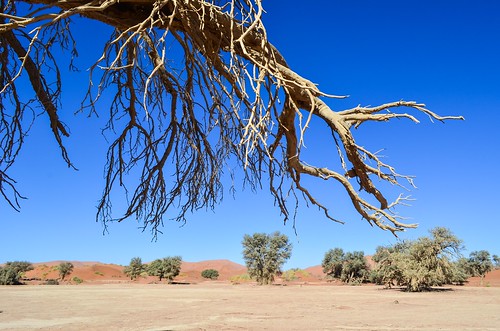
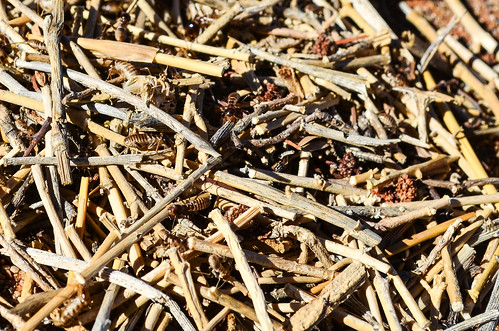

It’s hard for me to get a ride back, as everybody left before 12. The parking lots are almost empty. A ranger tells me that it’s because visitors are afraid of being outside with the heat. Oh right, it’s a desert, and I’m spending the whole day walking in the sand with only 1.5 L water and without a cap. It didn’t seem strange to me, as it’s a rest day compared to my average cycling day.
Then, thinking that visitors may come back again, for me to catch a ride, in the late afternoon, I walk the distance between the two parking lots and kill time by visiting Hidden Vlei, another place where nobody goes, because one needs to walk 2 km (one way).
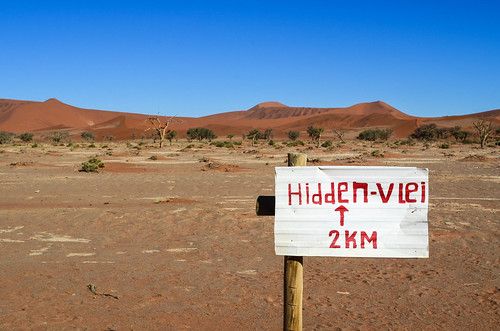
The problem with this one is that there is no signage and no footsteps trail to follow. Well, I’ll just walk 2 km in the same direction, my GPS recording my track. Even if I don’t know where Hidden Vlei is, I can always walk back to the road.

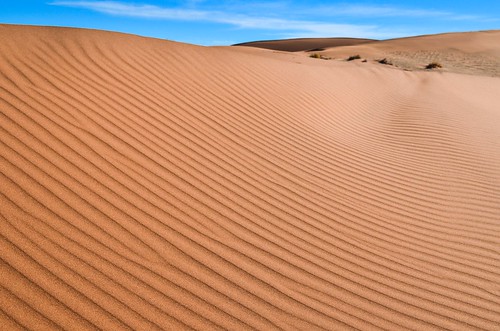


All in all, I have been walking 19 km in the sand today. My calves are sore, I’m not sure I can call it a rest day …
Dune after dune, I finally reach Hidden Vlei, another dry pan.
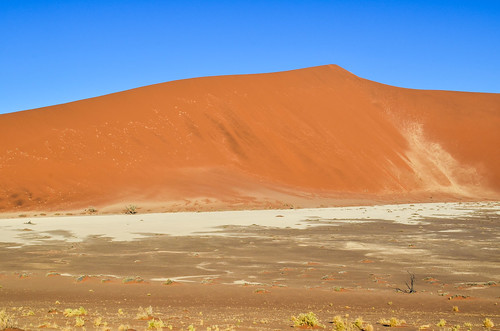
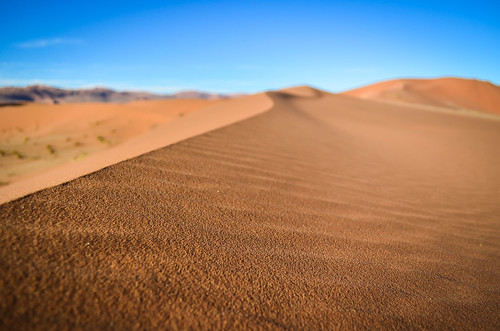

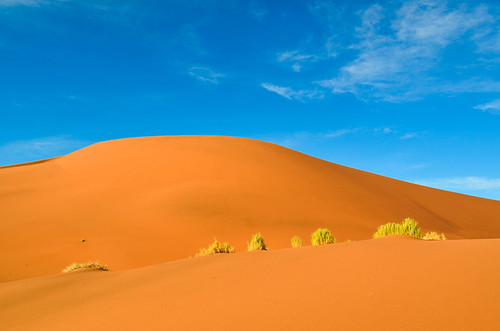
And once back on the tar road, I finally catch a ride back, one more time with Swiss people. It’s almost sunset and the very quiet road has so much game in the Tsauchab valley: there are oryx every 5 km, but also jackals, ostriches, springboks …

Exhausted and back at the Sesriem gate, I exit when the office is closing and avoid the fine in place for visitors who stay beyond sunset. The owner of the Campsite Oasis, who had already let me camp for free the night before at the overlander’s campsite, now lets me camp at the luxury camp site for a small fee. And luxury camp sites of Namibia offer better comfort than any cheap hostel I’ve stayed at in West and Central Africa!

The luxury camp site is a private wooden construction, with a never ending hot shower, private toilet, and kitchen area. I don’t need any of these, yet it feels good. I still have to built my tent sheltered from the wind the best I can, and Dutch neighbors invite me for dinner for the second evening in a row.
Most tourists go back to Windhoek and Walvis Bay, while I am continuing south tomorrow. It will be very lonely, so I pack all the food I can from the Sesriem service station.







JB, I’m sure you don’t need to be told but your photos are utterly stunning.
Can we make a place one day that has the walls entirely covered with your photos as high definition printed murals? That would be divine!
M :-*